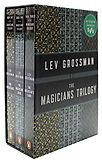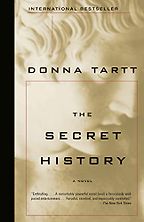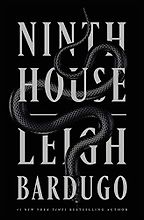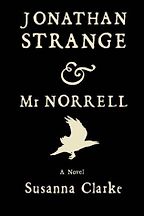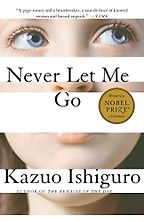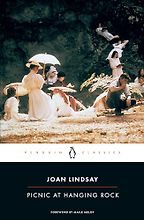The term ‘dark academia’ has been applied widely, from novels to films to fashion. What does it mean?
It’s one of those phenomena that has very deep roots – it’s been gestating for a long time, but only recently got a name. It’s about the idea that learning and the pursuit of knowledge, instead of leading one to light and clarity, can lead one into places of darkness and horror. And while you’re going to that place of darkness and horror, you acquire lots of cool-looking books and candles, and you sit in overstuffed armchairs on rainy days… It has a whole aesthetic that’s gathered around it.
Those are its two aspects, which are obviously closely interlinked. When I was writing The Magicians in 2009, I was not familiar with the term ‘dark academia’. I only encountered it years later, and then retroactively realized that my books probably fit inside it.
It has roots in the Gothic, in Romanticism, and in fantasy. I’m sure Harry Potter has a lot to do with dark academia. It’s one of those things that’s over-determined – it came out of a lot of intersecting strands.
Your first choice is a giant of the genre: could you introduce us to The Secret History by Donna Tartt?
This was the first novel by Donna Tartt. It famously took her many, many years to write. It’s set at a small exclusive college in New England – probably at Bennington, although that’s not what she calls it – where a student shows up who’s an outsider. He comes from suburban California, and he somehow finds his way into this clique of students who have gathered around a very influential professor of classics. Together, they plumb the mysteries of the ancient world, which leads to them reenacting cultic rituals and strange phenomena and violent behaviour. They go down the rabbit hole of dark academia, and that turns out to be a very scary and dangerous place.
It’s something of a thriller, and something of a mystery, but also written with a great amount of literary flair. It’s held up as one of the early novels that is difficult to classify as literary or genre, and it was wildly popular with people like me who find the trappings of reading and learning – the libraries and all the rest of it – unbelievably appealing.
You mentioned the difficulty with classification – would you consider the book to have fantasy elements?
There’s a question at the heart of the book about whether they have summoned supernatural forces, which have taken possession of them and wrought evil around them, or whether the darkness came from inside them. It’s a question that Tartt wisely leaves unresolved.
Your next choice is set in a US college again – Leigh Bardugo’s Ninth House.
This is the most contemporary novel on the list. It’s set at Yale. Yale famously has about a dozen secret societies, which have these interesting stone headquarters dotted around New Haven. If you’ve ever gone there, you’ll be aware of them as a mysterious presence… Probably all that actually goes on in them is a lot of drinking and hooking up. But in the fantasy world of Ninth House, they are hotbeds of actual sorcery, and each house has a particular magical specialty that it practices, and the magic is always crossing dangerous lines and getting them into trouble. So there is a ninth house which is tasked with keeping all the others in line, and making sure things don’t go off the rails.
That is where our heroine comes in. (She’s also from California; there’s probably a lot of The Secret History in Ninth House.) She knows nothing about magic when she arrives at Yale, and she has to learn everything, so we learn about it with her. Although she starts from a place of ignorance, she discovers that she has great power within herself, which is very satisfying.
We’re unravelling old mysteries around the campus. But the real pleasure of it is the amazingly rich, magical setting and magical system that Bardugo constructs, and the way in which it crosses with the young intellectual American aristocracy. So you have people performing divinations to try and figure out what the stock market is going to do, and making lots of money from it, and buying nice clothes as a result. It’s a really appealing novel, and just an amazing piece of writing.
You mention that the reality of these societies is probably hookups and drunken parties… It feels like these books maybe stand in for what people don’t find in reality at these institutions.
It’s true. I went to Harvard as an undergraduate, and I’ve been asked if the school in The Magicians is based on Harvard. And of course, it isn’t – it’s what I hoped that Harvard would be. I had hoped that they would be guardians of secret knowledge, which everybody would obsessively pursue – while, you know, looking very good and drinking lots of cocktails. That didn’t turn out to be the reality. But it remains a compelling thing to think about.
Tell us a little about the story of The Magicians.
A young man named Quentin goes from Brooklyn to a secret school for magic. It’s an attempt to look realistically at what it would actually be like, as a teenager, to be introduced to the study of magic – how fun and exciting it would be to be in possession of secret knowledge and powers that no one else has, and to go places and do things that ordinary people can’t do. But it also tries to take seriously how unbelievably stupid teenagers are, and the horrible mistakes that they would definitely make if they could actually do magic.
Yes, that really comes through. The intense insider-outsider dynamic…
And that is a common thread through all dark academia: being led from the outside into an inner circle, defined by the possession of knowledge which only certain people can truly understand and use. The people who have and use it are, at the same time, doomed by this privilege. But they look so good while they’re going to their dooms.
Not all academics look good in your next choice. Please introduce us to Jonathan Strange and Mr Norrell, by Susanna Clarke.
This really is one of my all-time favourite novels – it’s possibly my favourite novel by a living person. It doesn’t fit the typical mould in that it’s not set at a university or a school. It’s set in England during the Napoleonic Wars, and it’s about two magicians. Magic has long since faded from the world and become a dry theoretical topic, until Mr. Norrell figures out how to do it for real. He is actually a very realistically depicted academic, in that he’s unbelievably dry and humourless, and just spends his days and nights beavering away at the minutiae of the topic that he studies. At the same time, another magician arises, Jonathan Strange. He’s much more the dark academia avatar: he’s tall, aristocratic, funny, good-looking…
Strange and Norrell have opposing ideas about what magic should be and where it comes from. Norrell is a moderniser: magic is a tool, it’s useful, but we shouldn’t get any dark academic ideas about it. Jonathan Strange is all dark academia: he wants to follow magic’s roots back into the past and into the fairy world, back to this mysterious figure named John Uskglass, the father of English magic. Norrell and Strange desperately need each other because they’re the two geniuses of magic, but they also can’t reconcile their opposing philosophies.
Meanwhile, the Napoleonic wars are happening, and lots of fairies are running around… It’s a truly amazing book. I don’t know if I’ve ever read magic described so convincingly.
And this book is a somewhat pseudo-academic text itself, with lots of footnotes…
Yes!. It is adorned with its own internal academic apparatus, these brilliant footnotes, which initially gave me bad flashbacks to Infinite Jest, but then I realised that they were their own thing. They’re a wonderful, whimsical way to provide context and history, and they seem to gesture at this vast academic literature of magic which is out there – without, of course, giving you the whole of it. That’s also part of that dark academic feeling: this sense that there is a vast body of hidden knowledge, and you are just brushing up against it and getting the tiniest sliver of it. You feel this sense of the sublime, of everything that must be out there, just out of your reach.
Your next choice is a really interesting one – it has a totally different feel, but it absolutely is dark academia. Tell us about Kazuo Ishiguro’s Never Let Me Go.
Never Let Me Go sits at the opposite pole from Jonathan Strange and Mr. Norrell, in that it really belongs in the science fiction world, and is in many ways gritty and crushingly grim. It’s a difficult book to talk about because one almost doesn’t want to give away the premise, which drops on you like a ton of bricks around page eighty or so… It’s set at a very unusual boarding school where the students are being raised and educated for the absolute darkest of purposes, which they initially have no knowledge of or control over, and prove ultimately unable to escape from. You can only sit and watch them go to meet their inevitable fates. I feel like it’s a book about the inescapability of death, and the particular way it comes to you in late capitalism. If you could choose to project yourself into any of these books, it would be your last pick, because it is very unromantic in its depiction of the academic world, but it is still a world in which knowledge leads to great pain and suffering and darkness.
I think in most of these books, there is a fateful choice that the hero makes to partake of forbidden knowledge. What’s distinctive about Never Let Me Go is that the children have no choice. It’s thrust upon them, and they just have to sit and wait to be devoured by it.
Of all your choices, this feels the most truly anxious about the role of education and institutions in our lives…
Yes – it goes beyond anxiety, to resignation. It’s a painful book to read, one that I don’t know if I’ll ever reread, but I’ll never forget that experience.
Let’s talk about your last choice: please introduce Picnic at Hanging Rock, by Joan Lindsay.
This is the masterpiece of my adopted country, Australia. It’s set at a boarding school for girls – a very proper, very English boarding school of the kind that you only see in Australia, where people try almost too hard to become English. It’s about a school excursion. The girls go and have a picnic at a local geological formation called Hanging Rock, which actually exists. A few of the girls go climbing up the rock, and they never return.
The book is about the aftermath of their disappearance and its effect on the people around them. Little hints at what might have happened to them leak out and drive people literally insane. It’s as if it were the story of Narnia, but turned inside out. It’s about what would happen to the people from whose lives the children disappeared, and the ways in which they would fall apart, trying to understand where they had gone and what had happened to them.
It’s an amazing book, which I think is also about colonialism, and the attempt to impose order and a particular naive Western idea of civilization on a place which is wild and foreign to it. There’s a very famous movie made of it as well.
As for its place in dark academia… It has these wonderful trappings of an English boarding school, with everybody speaking in a certain way and wearing the uniforms and going about the rituals of being a sporting English school student, but you’re overwhelmingly aware of this darkness very near to them, and they’re aware of it too. They can’t make any sense out of the disappearance of the girls. And, spoiler alert, we’re never told what happens to them, and they never return – or rather, one of them returns, but can’t remember what happened to her. And that’s the end. It’s all about what happens when people stare into this unsolvable mystery, and the havoc it wreaks on them. It’s a truly unique book and a genuine masterpiece. I think Joan Lindsay was something like seventy when she wrote it, so there’s hope for us all!
Except for the girls who went up Hanging Rock. There’s no hope for them.
There was originally a final chapter that she was advised to leave out, which was published posthumously – have you let yourself read it, or preserved the mystery?
Oh, of course – once I learned it was out there, I couldn’t stop myself. But whoever advised her to leave it out gave her very good advice. It’s certainly interesting, and I think it has to do with her trying to introduce into the story some of the indigenous Australian mythology. The girls go into a dream-time-like world where time doesn’t exist, and vistas of knowledge open up to them. It’s actually a little bit of a happy ending, in that the girls are not at all saddened by their fate, and they have no desire to return home. It’s a funny turn from the darkness of the rest of the book, and I think it would detract from the power of the whole – it would be a different book if she’d left it in.
Alright – we’ll strike that chapter from the recommendations list. I’m amazed, looking over your list, at the diversity of the stories that contain these dark academia elements.
It’s funny, I find myself turning over this idea of dark academia… Once you think of it as a category, it turns out to be everywhere. It exists purely as an aesthetic, apart from any actual books, and there are plenty of people who just think of it as a way of dressing and photographing themselves. But when you look back, so many works retroactively fall into the ‘dark academia’ category. I almost put Frankenstein on the list, for example, in that it is a story about the pursuit of knowledge that leads one into forbidden territories. I feel like it’s not as sexy as dark academia is supposed to be. But there’s this very primal mythological story about knowledge leading to the fall, which dark academia has its roots in – the Bible is dark academia.
Dark academia has been taken to this very specific, wonderfully aestheticised place. The idea has become extra-refined now because it is specifically about knowledge that does not exist on computers or in digital form – it’s the kind of knowledge that you’d only find in books, and nowhere else. And the pervasiveness of empty digital information makes us yearn even more for this kind of knowledge.
Five Books aims to keep its book recommendations and interviews up to date. If you are the interviewee and would like to update your choice of books (or even just what you say about them) please email us at [email protected]
Five Books interviews are expensive to produce. If you've enjoyed this interview, please support us by donating a small amount.

